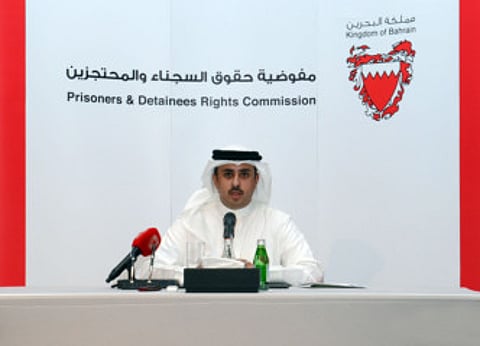Detained juveniles require special measures
Bahrain watchdog’s report issues recommendations after four-day inspection at the Dry Dock Detention Centre

Manama: The number of staff with expertise in dealing with detainees should be increased while special measures for those aged between 15 and 18 should be introduced, a report by Bahrain’s prison watchdog has said.
The report, compiled following an unannounced four-day inspection visit by the Prisoners and Detainees Rights Commission (PDRC) to the Dry Dock Detention Centre (DDDC), said that juveniles needed the special measures for visits, communications and activities and called for motivating them to complete their studies.
The Commission said that the staff should be given regular training on how to deal with old and special needs detainees as well as with foreign nationals. Staff should also be trained in managing and assessing risks, the report on the visit conducted on April 21-24 said.
Commission Chairman Nawaf Al Moawda told the media at the launch of the report, the first to be drafted by the newly created body, that the 1,020-capacity detention centre held 991 detainees, including 108 who were ageed between 15 and 18.
He said that 765 detainees were Bahrainis and 226 were foreign nationals.
Al Moawda said that the Commission inspected all buildings in the facility, including wards and cells, conducted unmonitored interviews and had free interactions with the detainees in order to gather first-hand information on all issues, concerns or difficulties they encountered. It used the Bahrain Ombudsman’s Standards for Visiting Prisons and Places of Detention as a basis for the inspection, he added.
For their inspection, the commissioners relied on evidence gathering from the DDDC staff, through access to documents and records in all sections, and from a review of the administrative system in the detention centre.
The commissioners also interviewed detainees who provided them with information and observed the conditions of the facility to assess suitability and compliance with international standards, Al Moawda said.
He added that the commissioners had attended overseas training and observed actual inspections.
“The assistance of experts from Her Majesty’s Inspectorate of Prisons for England and Wales (HMIP) and others in the field of prison inspections was sought to obtain experience and knowledge on the best practices of inspection procedures and to develop the necessary frameworks and guidelines to promote the rights of prisoners and detainees in the Kingdom of Bahrain,” he said.
“The establishment of the Commission is very significant in the field of human rights in the Kingdom of Bahrain. PDRC was entrusted with the inspection of prisons, detention, juvenile centres and other places where it is possible to detain individuals such as hospitals and psychiatric facilities. The establishing decree enables the PDRC to inspect the detainees’ conditions and the treatment they receive to ensure they are not subjected to torture or cruel, inhuman or degrading treatment,” Al Moawda said. .
He added that the Commission’s Decree was in accordance with the Convention against Torture and Other Cruel, Inhuman or Degrading Treatment or Punishment, ratified by the Kingdom of Bahrain in 1998. The decree has also taken into account the principles of the Optional Protocol of the Convention. It also complements the recommendations of the Bahrain Independent Commission of Inquiry (BICI), the international panel of experts that assessed the dramatic events that hit Bahrain in February and March 2011 and their consequences.
The report set out 21 recommendations to enhance special humane treatment and conditions.
They included urgent action to ensure the cleanliness of the wings and periodic overall maintenance, providing a suitable waiting area for visitors, and taking measures to ensure detainees can contact their families upon arrival at the centre.
Other recommendations called for procedures to ensure detainees can inform their lawyers and families when they are transferred, installing surveillance cameras to cover all the facilities of the detention centre and putting in place written procedures and measures for the delivery and exchange of personal necessities of detainees.
The report urged developing educational, cultural plans and programmes for all detainees and encouraging them to be actively involved in them.
Well-trained and qualified staff should be provided to oversee the learning and skill acquisition programmes, the report recommended.
A library should be provided and proper procedures established to guarantee the delivery of reading materials.
The report recommended establishing procedures for the legal use of force in the detention centre, alongside proper training for the staff.
Publications covering rights and duties in several languages and in Braille (for the blind) should be given to detainees upon arrival and written procedures for complaints and grievances and for the protection of complainants in order to ensure privacy and follow-up should be available, the report said.
In the area of special health care, the centre should increase the number of medical professionals, provide a dental clinic and a trained mental health team, and establish programmes for health promotion and awareness among the detainees and staff.
Necessary measures should be taken to raise the level of awareness among staff and detainees on ways to deal with patients and explain the concept of medical isolation.
Other recommendations called for the increase of the number of administrative staff at the health centre, the provision of an infection control team and the activation of the administrative supervision over the clinic and its staff.
Translation services should be provided for detainees during visits to the health centre and special diets should be guaranteed for detained patients, the report said.



